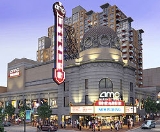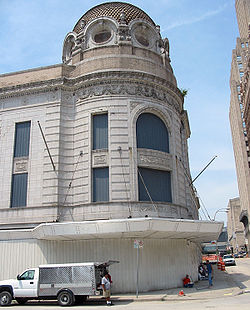
Mainstreet Theater
Encyclopedia
The AMC Era
AMC Theaters, then known as Durwood Theatres, bought the theater in the late 1950s and reopened it in December 1960 as the Empire. The first film shown at the theater under the new name was ExodusExodus (film)
Exodus is a 1960 epic war film made by Alpha and Carlyle Productions and distributed by United Artists. Produced and directed by Otto Preminger, the film was based on the 1958 novel Exodus, by Leon Uris. The screenplay was written by Dalton Trumbo, which represented the breaking of the Hollywood...
. The standard seating configuration of the new Empire was reduced to 1260 in order to accommodate more modern amenities and technology upgrades. Under Durwood, the Empire began running the seamless 70 mm film
70 mm film
70mm film is a wide high-resolution film gauge, with higher resolution than standard 35mm motion picture film format. As used in camera, the film is wide. For projection, the original 65mm film is printed on film. The additional 5mm are for magnetic strips holding four of the six tracks of sound...
version of Cinerama, replacing the three strip Cinerama. The 70 by 30 feet (9.1 m) Walker Hi Gain motion picture screen was designed to collapse, fold, and store on stage within two and a half hours to allow for quick conversion for live stage events. The stage curtain measured more than 120 feet (36.6 m) and claimed to be the largest in the world. In fitting with Kansas City's reputation as the "City of Fountains", the Empire included decorative fountains in the box office area and at the main staircase. The prominent signage suspended from scaffolding attached to roof of the building during the "Mainstreet" and "RKO Missouri" eras was removed when Durwood converted the theater to the Empire. The Empire did keep an organist until 1961, when there was a dispute with the musicians' union.
In 1967, the theater was split into two parts when a second theater was constructed in the former balcony of the original theater. In 1980 AMC converted the Empire into four theaters and it was known as Empire 4 Theaters. Two of the additional theaters were located in the upper level where the original balcony once existed. The Empire stopped screening films and closed in 1985.
An Uncertain Future

George Burns
George Burns , born Nathan Birnbaum, was an American comedian, actor, and writer.He was one of the few entertainers whose career successfully spanned vaudeville, film, radio, television and movies, with and without his wife, Gracie Allen. His arched eyebrow and cigar smoke punctuation became...
even joined the effort and wrote a letter on behalf of the effort to have it declared a historic landmark. Since the theater was not listed as a local landmark or listed on the National Register of Historic Places
National Register of Historic Places
The National Register of Historic Places is the United States government's official list of districts, sites, buildings, structures, and objects deemed worthy of preservation...
, there was not much legal protection to prevent demolition of the deteriorating structure.
Owner Larry Bridges expressed desire to raze the Empire several times and even obtained a pre-demolition inspection permit from the city in August 2003. Bridges planned to team with DST Realty to build a new headquarters for Kansas City Power & Light on the site. The City of Kansas City blocked the plan, which had called for saving the facade but demolishing the core structure of the Empire.
In 2004, the Kansas City Chapter of the American Institute of Architects
American Institute of Architects
The American Institute of Architects is a professional organization for architects in the United States. Headquartered in Washington, D.C., the AIA offers education, government advocacy, community redevelopment, and public outreach to support the architecture profession and improve its public image...
compiled a list of 25 buildings in the central business district believed to be significant downtown landmarks "worthy of attention and reuse". The Empire Theater was listed as the most endangered building at the time the list was compiled. The building had fallen under such an extreme state of disrepair that bricks were falling from the building and trees were sprouting from the roof.
Redevelopment
The City of Kansas City reached an agreement to purchase the theater from Larry Bridges in late 2004 while it was acquiring properties for the future Power and Light District. In November 2005, the State of Missouri approved up to $938,538 in Brownfields Redevelopment Program remediation tax credits to help offset costs involved in the cleanup of asbestos at the theater. An estimated 200 dump-truck loads of asbestos and mold-covered debris were removed from the theater during the cleanup process. Power & Light District developer Cordish reached an agreement with AMC to form a joint venture, Midland-Empire Partners LLC, to redevelop both the Empire Theater and the nearby Midland TheatreMidland Theatre
The Midland Theatre is a 3,573-seat theater located in the Power & Light District of Kansas City, Missouri, USA.The National Collegiate Athletic Association under Walter Byers had its headquarters in the building from the 1950s until it moved to 6299 Nall Avenue at Shawnee Mission Parkway in...
.
Re-Opening
The AMC Mainstreet Theater opened to the public under its original name as part of the Power & Light District on May 1, 2009, after a test period of playing second-run films for employees and invited guests beginning April 18, 2009. The theater also hosted the Kansas City Film Festival April 22–26, 2009. AMC stated that the Mainstreet is its "flagship theater", spending $30 million dollars on the renovation.The renovated theater features six auditoriums, on two floors. The ground floor has three standard auditoriums, while the upper level features "cinema suites" with reclining loungers, food trays, and a call button to summon a server. All auditoriums feature 4k digital projection and 11 channel sound, including overhead speakers and bass shakers mounted under the seats. AMC claims that it is one of the most technologically-advanced theater setups in the world.
All six auditoriums feature reserved seating.
The lobby area features a restaurant called The Marquee which opened on Friday, March 27, 2009.
Early reports claimed that the theater would feature "documentaries, independent, and foreign films", but upon opening the selection was limited to mainstream Hollywood films.
On May 26, 2009, the theater was awarded the "Dr. George Ehrlich Achievement in Preservation Award" by the Historic Kansas City Foundation.

